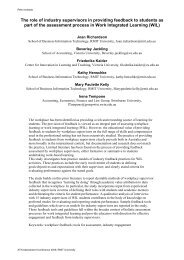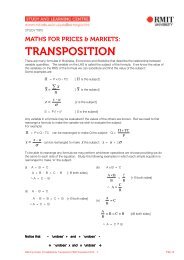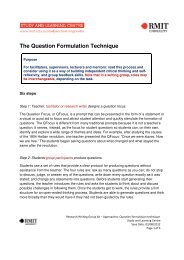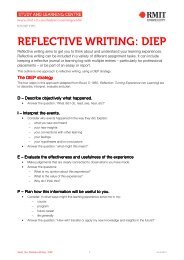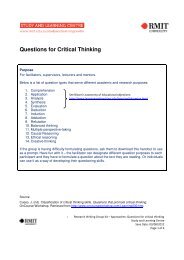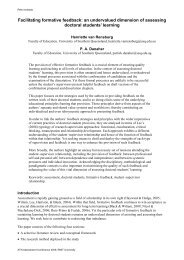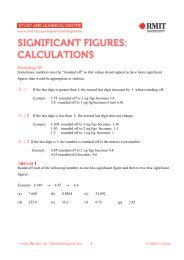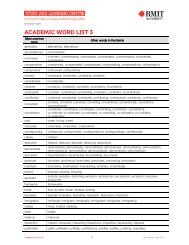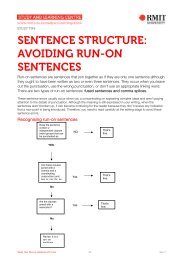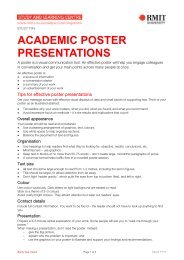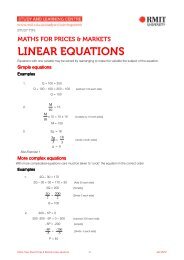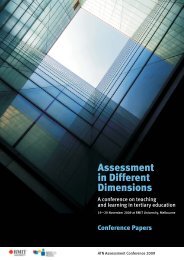student feedback and leadership - Office for Learning and Teaching
student feedback and leadership - Office for Learning and Teaching
student feedback and leadership - Office for Learning and Teaching
You also want an ePaper? Increase the reach of your titles
YUMPU automatically turns print PDFs into web optimized ePapers that Google loves.
Student Feedback & Leadership<br />
In addition, the PVC (Student Services) area undertakes periodic surveys<br />
of <strong>student</strong>s on institution-wide issues <strong>and</strong> does establish programs in response<br />
to <strong>student</strong> <strong>feedback</strong>, but there is no <strong>for</strong>mal linkage between these surveys<br />
<strong>and</strong> the CES.<br />
RMIT University has per<strong>for</strong>med well on some <strong>student</strong> outcomes indicators <strong>for</strong><br />
the <strong>Learning</strong> <strong>and</strong> <strong>Teaching</strong> Per<strong>for</strong>mance fund such as graduate employment.<br />
However, it has not per<strong>for</strong>med well on <strong>student</strong> outcomes indicators <strong>for</strong> good<br />
teaching, generic skills <strong>and</strong> overall satisfaction, based on the CEQ.Per<strong>for</strong>mance<br />
on these scales has improved marginally within RMIT but has not improved<br />
in past years in relation to other universities (DEST 2000-2007)<br />
This intersection of the need <strong>for</strong> the university to improve <strong>student</strong> <strong>feedback</strong><br />
<strong>and</strong> to provide greater clarity on the <strong>leadership</strong> <strong>and</strong> responsibility of staff<br />
involved across the university set the purpose <strong>for</strong> this project.<br />
1.3 Context<br />
The Project proposal identified that giving <strong>and</strong> receiving <strong>student</strong> <strong>feedback</strong><br />
is an essential element of the learning <strong>and</strong> teaching process. DEST has<br />
recognised the importance of <strong>student</strong> <strong>feedback</strong> <strong>for</strong> the quality of learning<br />
through investment in strategies to collect <strong>and</strong> analyse <strong>student</strong> <strong>feedback</strong><br />
data in the course experience, postgraduate research <strong>and</strong> <strong>student</strong> satisfaction<br />
in Course Experience Questionnaire (CEQ). According to Stevens (2005 p87)<br />
‘managing <strong>student</strong> <strong>feedback</strong> <strong>and</strong> managing the actions taken in response<br />
to this <strong>feedback</strong> are the most important areas <strong>for</strong> assuring quality in learning<br />
<strong>and</strong> teaching’. This currently is badly managed at RMIT.<br />
The effective use of <strong>student</strong> <strong>feedback</strong> is uneven. There is a lack of documented<br />
evidence demonstrating how the challenges of using <strong>feedback</strong> are being<br />
met in different organisational units in universities <strong>and</strong> there is little evidence<br />
that current ways of using <strong>student</strong> <strong>feedback</strong> are making any contribution<br />
to improving the overall quality of learning <strong>and</strong> teaching (Kember, Leung<br />
<strong>and</strong> Kwan, 2002).<br />
Given that the challenges <strong>and</strong> opportunities identified above <strong>for</strong> more effective<br />
use of <strong>student</strong> <strong>feedback</strong> are not unique to RMIT University, the outcomes<br />
of the project are considered to be of value to other educational institutions.<br />
A sustainable approach to building <strong>leadership</strong> <strong>and</strong> the effective use of <strong>student</strong><br />
<strong>feedback</strong> that may be scaled up or adapted to different contexts is of national<br />
significance <strong>and</strong> can contribute to improvements in the quality of learning <strong>and</strong><br />
teaching. Other universities will be interested in improving good teaching<br />
indices to enhance their teaching per<strong>for</strong>mance. An example of this interest<br />
is the substantial work that has been done by a consortium of universities<br />
to code <strong>and</strong> use qualitative comments from CEQ, (DEST Evaluation <strong>and</strong><br />
Investigation Project, 2005). Advancement in these areas of practice will<br />
result in improvement in the quality of teaching practice, the quality<br />
of programs <strong>and</strong> <strong>student</strong> learning outcomes <strong>and</strong> experiences.<br />
Page 16



